Top Rankings
Garfield Public School District ranks among the top 20% of public school district in New Jersey for:
Category
Attribute
Community Size
Largest student body (number of students) (Top 1%)
For the 2025 school year, there are 7 public elementary schools serving 3,073 students in Garfield Public School District. This district's average elementary testing ranking is 3/10, which is in the bottom 50% of public elementary schools in New Jersey.
Public Elementary Schools in Garfield Public School District have an average math proficiency score of 27% (versus the New Jersey public elementary school average of 37%), and reading proficiency score of 40% (versus the 49% statewide average).
Minority enrollment is 66% of the student body (majority Hispanic), which is more than the New Jersey public elementary school average of 63% (majority Hispanic).
Overview
This School District
This State (NJ)
# Schools
11 Schools
1,930 Schools
# Students
4,800 Students
886,629 Students
# Teachers
426 Teachers
77,858 Teachers
Student : Teacher Ratio
11:1
11:1
District Rank
Garfield Public School District, which is ranked within the bottom 50% of all 646 school districts in New Jersey (based off of combined math and reading proficiency testing data) for the 2021-2022 school year.
The school district's graduation rate of 72% has decreased from 81% over five school years.
Overall District Rank
#435 out of 650 school districts
(Bottom 50%)
(Bottom 50%)
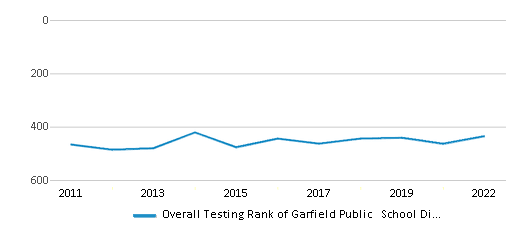
Math Test Scores (% Proficient)
27%
36%
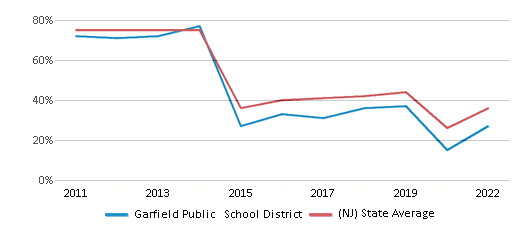
Reading/Language Arts Test Scores (% Proficient)
42%
49%
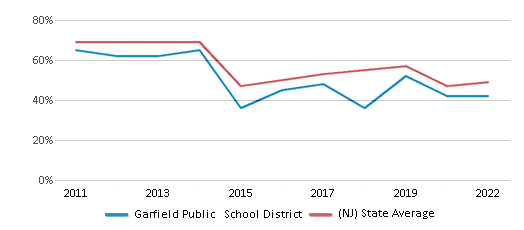
Science Test Scores (% Proficient)
14%
23%
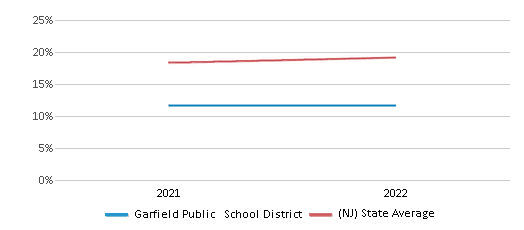
Graduation Rate
72%
85%
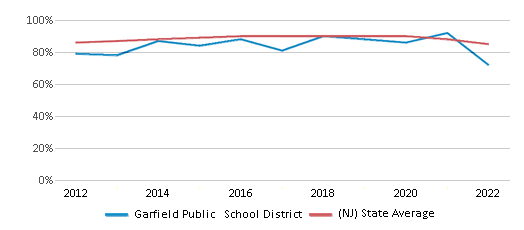
Students by Ethnicity:
Diversity Score
0.57
0.72
# American Indian Students
3 Students
1,992 Students
% American Indian Students
n/a
n/a
# Asian Students
59 Students
92,318 Students
% Asian Students
1%
10%
# Hispanic Students
2,711 Students
301,752 Students
% Hispanic Students
56%
34%
# Black Students
371 Students
132,335 Students
% Black Students
8%
15%
# White Students
1,610 Students
325,482 Students
% White Students
34%
37%
# Hawaiian Students
3 Students
1,690 Students
% Hawaiian Students
n/a
n/a
# Two or more races Students
39 Students
30,907 Students
% of Two or more races Students
1%
4%
Students by Grade:
# Students in PK Grade:
595
41,362
# Students in K Grade:
357
85,425
# Students in 1st Grade:
352
93,943
# Students in 2nd Grade:
319
96,713
# Students in 3rd Grade:
323
95,865
# Students in 4th Grade:
309
97,373
# Students in 5th Grade:
329
98,202
# Students in 6th Grade:
322
99,575
# Students in 7th Grade:
315
80,278
# Students in 8th Grade:
315
80,823
# Students in 9th Grade:
359
4,713
# Students in 10th Grade:
324
4,047
# Students in 11th Grade:
272
3,770
# Students in 12th Grade:
309
4,350
# Ungraded Students:
-
190
District Revenue and Spending
The revenue/student of $27,655 is higher than the state median of $26,931. The school district revenue/student has stayed relatively flat over four school years.
The school district's spending/student of $26,293 is higher than the state median of $25,828. The school district spending/student has stayed relatively flat over four school years.
Total Revenue
$133 MM
$36,642 MM
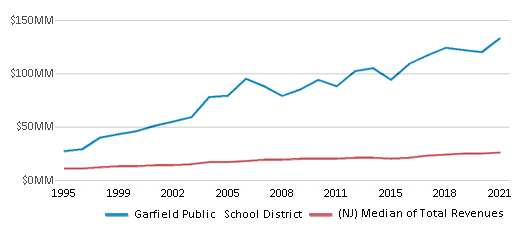
Spending
$126 MM
$35,142 MM
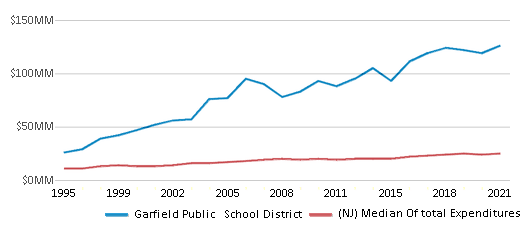
Revenue / Student
$27,655
$26,931
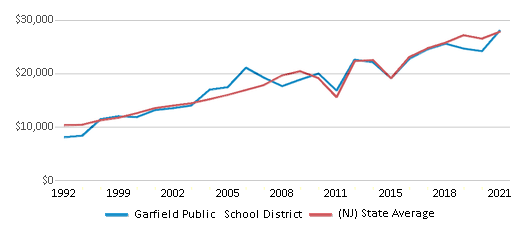
Spending / Student
$26,293
$25,828
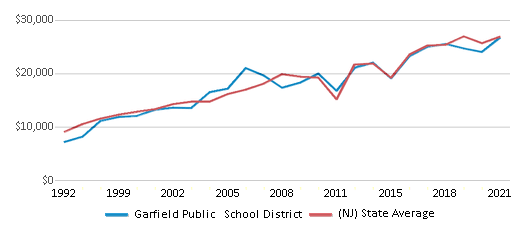
Best Garfield Public School District Public Elementary Schools (2025)
School
(Math and Reading Proficiency)
(Math and Reading Proficiency)
Location
Grades
Students
Rank: #11.
James Madison School #10
(Math: 60-64% | Reading: 65-69%)
Rank:
Rank:
9/
Top 20%10
55 Lincoln Place
Garfield, NJ 07026
(862) 306-7190
Garfield, NJ 07026
(862) 306-7190
Grades: PK-5
| 273 students
Rank: #22.
Washington Irving School #4
(Math: 55-59% | Reading: 55-59%)
Rank:
Rank:
8/
Top 30%10
12 Madonna Place
Garfield, NJ 07026
(973) 340-5034
Garfield, NJ 07026
(973) 340-5034
Grades: PK-5
| 395 students
Rank: #33.
Thomas Jefferson School #9
(Math: 40-44% | Reading: 50-54%)
Rank:
Rank:
6/
Top 50%10
62 Alpine Street
Garfield, NJ 07026
(973) 340-5039
Garfield, NJ 07026
(973) 340-5039
Grades: PK-5
| 369 students
Rank: #44.
Christopher Columbus School #8
(Math: 30-34% | Reading: 40-44%)
Rank:
Rank:
5/
Bottom 50%10
147 Cedar Street
Garfield, NJ 07026
(973) 340-5038
Garfield, NJ 07026
(973) 340-5038
Grades: PK-5
| 392 students
Rank: #55.
Roosevelt School #7
(Math: 30-34% | Reading: 30-34%)
Rank:
Rank:
4/
Bottom 50%10
225 Lincoln Pl
Garfield, NJ 07026
(973) 340-5037
Garfield, NJ 07026
(973) 340-5037
Grades: PK-5
| 312 students
Rank: #66.
Abraham Lincoln School #6
(Math: 20-24% | Reading: 35-39%)
Rank:
Rank:
3/
Bottom 50%10
111 Palisade Ave
Garfield, NJ 07026
(973) 340-5036
Garfield, NJ 07026
(973) 340-5036
Grades: PK-5
| 380 students
Rank: #77.
Garfield Middle School
(Math: 15% | Reading: 33%)
Rank:
Rank:
2/
Bottom 50%10
175 Lanza Ave
Garfield, NJ 07026
(973) 272-7020
Garfield, NJ 07026
(973) 272-7020
Grades: 6-8
| 952 students
Recent Articles

How Scaffolding Could Change the Way Your Child Learns
This article explores the concept of instructional scaffolding, a teaching method that enhances learning by breaking down complex tasks into manageable parts. It highlights how scaffolding supports students in developing critical thinking skills and becoming more independent learners. The article discusses the benefits of scaffolding, including improved engagement and reduced anxiety, and provides strategies for its implementation across various educational levels.

The Impact of Coronavirus on Public Schools
This article discusses the widespread impact of COVID-19 on public schools, addressing issues such as school closures, remote learning challenges, effects on standardized testing, and concerns about student progress. It also provides tips for parents suddenly faced with homeschooling responsibilities.

February 05, 2025
Understanding the U.S. Department of Education: Structure, Impact, and EvolutionWe explore how the Department of Education shapes American education, from its cabinet-level leadership to its impact on millions of students, written for general audiences seeking clarity on this vital institution.





